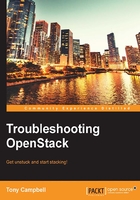
Preface
OpenStack is one of the fastest growing open source projects in the history. Its rapid adoption and popularity has led to an increase in the demand of OpenStack talent. The skills you will learn in this book will help you position yourself as an effective OpenStack troubleshooter.
What this book covers
Chapter 1, The Troubleshooting Toolkit, covers various tools that will provide invaluable as you troubleshoot OpenStack.
Chapter 2, Troubleshooting OpenStack Identity, helps you to quickly recognize and resolve identity and authentication issues.
Chapter 3, Troubleshooting the OpenStack Image Service, fixes problems with Glance, the OpenStack Image service.
Chapter 4, Troubleshooting OpenStack Networking, shows you how to resolve networking problems within your OpenStack cluster.
Chapter 5, Troubleshooting OpenStack Compute, adverts that the compute service is central to OpenStack, and this chapter includes helpful tips for quickly getting things resolved in case the service breaks.
Chapter 6, Troubleshooting OpenStack Block Storage, explores ways to resolve issues with persistent storage in an OpenStack cluster.
Chapter 7, Troubleshooting OpenStack Object Storage, introduces you to object storage in OpenStack and helps you master the techniques to resolve common issues.
Chapter 8, Troubleshooting the OpenStack Orchestration Service, discusses Heat, the OpenStack Orchestration service, and how to navigate through errors or problems with this service.
Chapter 9, Troubleshooting the OpenStack Telemetry Service, explores Ceilometer and how to troubleshoot issues with the telemetry processes and meters.
Chapter 10, OpenStack Performance, Availability, and Reliability, provides you with tips for maintaining the overall health of your OpenStack cluster.
What you need for this book
This book is based upon the Liberty release of OpenStack running on the Ubuntu operating system. While most of the content will be relevant to other versions of OpenStack, and alternate operating systems, the examples are based on the author's configuration.
Who this book is for
You will need a basic understanding of OpenStack, Linux, and cloud computing. If you have an understanding of Linux, this book will help you leverage that knowledge in the world of OpenStack, giving you confidence to tackle most issues that may arise.
Conventions
In this book, you will find a number of text styles that distinguish between different kinds of information. Here are some examples of these styles and an explanation of their meaning.
Code words in text, database table names, folder names, filenames, file extensions, pathnames, dummy URLs, user input, and Twitter handles are shown as follows: "Typing ceilometer help in the terminal will give you a list of the available commands."
A block of code is set as follows:
instance_usage_audit = True instance_usage_audit_period = hour notify_on_state_change = vm_and_task_state notification_driver = messagingv2
Any command-line input or output is written as follows:
sudo -u ceilometer ceilometer-api --config-file=/etc/ceilometer/ceilometer.conf --log-file=/var/log/ceilometer/ceilometer-api.log
Note
Warnings or important notes appear in a box like this.
Tip
Tips and tricks appear like this.
Reader feedback
Feedback from our readers is always welcome. Let us know what you think about this book—what you liked or disliked. Reader feedback is important for us as it helps us develop titles that you will really get the most out of.
To send us general feedback, simply e-mail <feedback@packtpub.com>, and mention the book's title in the subject of your message.
If there is a topic that you have expertise in and you are interested in either writing or contributing to a book, see our author guide at www.packtpub.com/authors.
Customer support
Now that you are the proud owner of a Packt book, we have a number of things to help you to get the most from your purchase.
Errata
Although we have taken every care to ensure the accuracy of our content, mistakes do happen. If you find a mistake in one of our books—maybe a mistake in the text or the code—we would be grateful if you could report this to us. By doing so, you can save other readers from frustration and help us improve subsequent versions of this book. If you find any errata, please report them by visiting http://www.packtpub.com/submit-errata, selecting your book, clicking on the Errata Submission Form link, and entering the details of your errata. Once your errata are verified, your submission will be accepted and the errata will be uploaded to our website or added to any list of existing errata under the Errata section of that title.
To view the previously submitted errata, go to https://www.packtpub.com/books/content/support and enter the name of the book in the search field. The required information will appear under the Errata section.
Piracy
Piracy of copyrighted material on the Internet is an ongoing problem across all media. At Packt, we take the protection of our copyright and licenses very seriously. If you come across any illegal copies of our works in any form on the Internet, please provide us with the location address or website name immediately so that we can pursue a remedy.
Please contact us at <copyright@packtpub.com> with a link to the suspected pirated material.
We appreciate your help in protecting our authors and our ability to bring you valuable content.
Questions
If you have a problem with any aspect of this book, you can contact us at <questions@packtpub.com>, and we will do our best to address the problem.